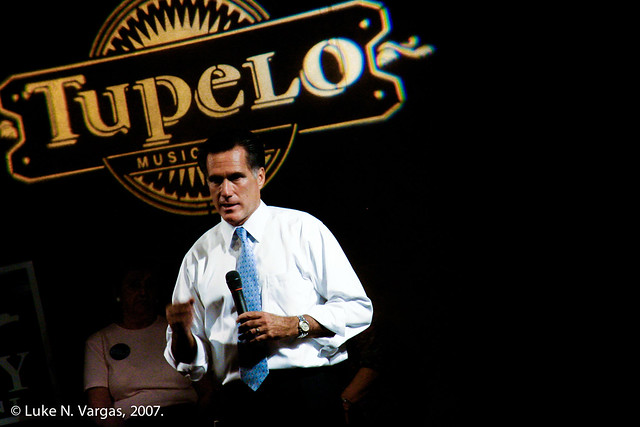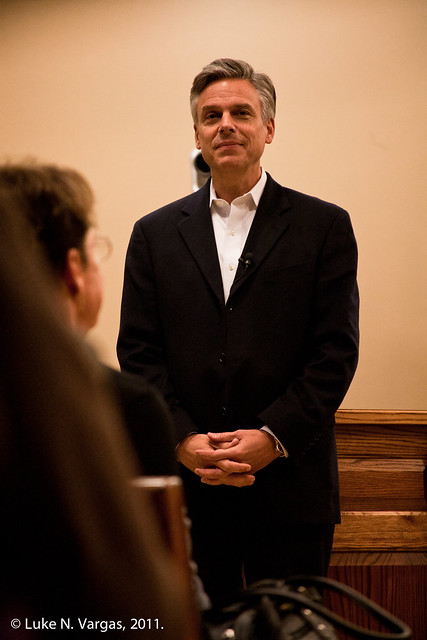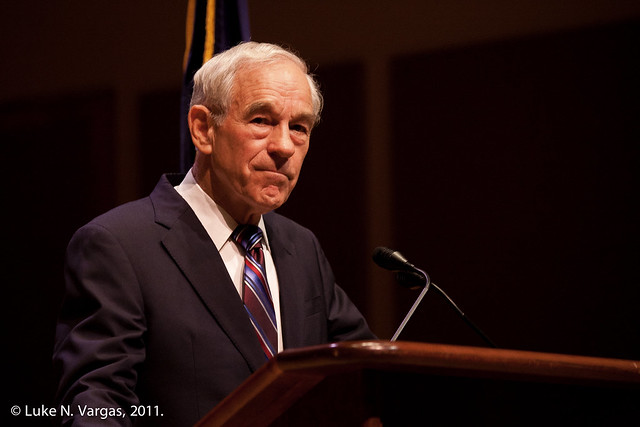Correct me if I am entirely misinterpreting things, but I have begun to get the impression of late that Mitt Romney may well lose the GOP nomination. And if he does, it could all fall apart just as fast as in 2008 (with his February 7 concession) despite being told all year that Romney had the resources to compete through numerous late primary states.
Standing in his way aren't the countless contests in states like Illinois, New Jersey, or Ohio, but the classic obstacles of Iowa, New Hampshire, and Mitt himself. Work with me —
After watching Mitt's interview yesterday with Fox's Bret Baier—in which he was taken to task for refusing to concede that he had changed his mind on a handful of issues—I was surprised by the extent to which Romney looks at once both accusatory and feeble. That's without opening his mouth: Standing in his way aren't the countless contests in states like Illinois, New Jersey, or Ohio, but the classic obstacles of Iowa, New Hampshire, and Mitt himself. Work with me —
Just as Romney crossed his legs before pushing back on Baier's legitimate questioning of his numerous flip-flops, a troublesome campaign scenario for him was born: the public impression of Romney's personality could crumble should he sense the nomination is slipping away from him for a second time. All it takes are some small hiccups in a sea of very impressive debates and town hall meetings, and the national momentum can begin to slip away.
Combine that with today's news that Newt Gingrich has summoned his formal and informal aides to instruct them to refrain from attacking Mitt Romney, and a strange dynamic emerges in which Gingrich can keep sailing on his calm rhetoric as displayed in debates, while Romney's steady thirst for the office—going on five years now since he announced in 2007—may be his biggest weakness.
Ironically, it's Gingrich's blinding self-confidence (often materializing in an arrogance towards his critics and any questioning media) that's lead him to run for President, but Romney's personal quest for the Presidency that could ultimately stand in his way.
Gingrich's financial motivation for effectively changing sides in policy arguments to appease lobbying clients looks oddly respectable—and, oddly, easier to explain away—than a change of heart concerning one's personal convictions.
At this point, Romney, Gingrich, Paul, and Huntsman look to be the only candidates with the capacity to shake up the election in the coming months. Rick Perry may have cash, Rick Santorum may have tirelessly taken his message to every corner of New Hampshire and Iowa, Michele Bachmann may continue to make her rounds of conservative media outlets of all sizes, but all three candidates have lost their audience. And then there's Herman Cain...
The campaigns of these candidates have stumbled for a variety of reasons, but it can as easily boil down to the likelihood that their message or campaign "personality" could evolve going forward. Without one of these wild cards, it's hard to stay relevant in today's media climate. Bachmann and Santorum tirelessly express complete conservative visions that ring with a conviction some of their opponents lack, but we've lost interest. Cain and Perry, meanwhile, have demonstrated themselves to be ineffectual in telling us anything new about their policy standards beyond prepared remarks.
On the flipside, there is information we are curious to know about Gingrich, Romney, Huntsman, and Paul.
For Gringrich, the public will be curious to know more about his connections to lobbying and hear how he defends his record. While this may seem like an inherently negative thing, it's worth noting that in the first two weeks of December, as the nearness of the Iowa Caucus begins to dawn on voters and their news attention, support rapidly consolidates in a fashion that put the relative highs and lows of the campaign henceforth to shame. Although it seemed for a moment that Herman Cain's supporters would surprise us by helping to hold up his high polling numbers, his meltdown ultimately occurred too early for the rank and file of his supporters to join hands and stand beside the candidate all the way until January.
If Gingrich can capitalize on his frontrunner standing in next week's debate in Iowa, the timing might be right for him to weather the attacks coming his way and maintain his lead going into January.
As for Romney, voters will feed off the continued excitement of watching him pretend he hasn't flip-flopped, and it is still worth acknowledging that he may handle this spotlight well and stay above water until New Hampshire. The primary change of the past weeks is a realization that Romney's business smarts and and crisp rhetoric in debates alone can do all the work for him. There are numerous tactical decisions that Romney and his team must make in the coming weeks to hold onto the nomination, and if either the candidate or the public get spooked, it is astonishing how quickly a campaign can unravel.
Jon Huntsman may have higher negatives than his opponents, but he remains the candidate with the least name recognition by a significant margin. We would be foolish to overlook the effectiveness of the media at introducing and crafting powerful opinions of political candidates in a staggeringly short time, and what this could mean for Huntsman's rather late arrival on the national scene.
To boot, Huntsman has been working hard to create openings for himself — such as his new emphasis on "too big to fail" banks and his articulate criticisms of Romney — in the political discourse of late. Should his forthcoming policy proposals be timely and relevant to the national political discourse the microphone could swing to him, I am beginning to sense a strong likelihood that Huntsman could catch fire coming out of Iowa.
He will be performing on a new, and smaller, stage once a handful of his opponents (read: Bachmann, Santorum, Perry, Cain) fall short of expectations and struggle to regain control over their message. Since Huntsman's legitimacy is rooted (not to mention well-earned) in the second contest of the voting season, he can rightly get a pass until round two. This is a significant advantage.
Huntsman's pitch is getting good, and this sustained practice with his unique message is invaluable once votes begin to be cast and the stakes of an actual election for higher office collectively set in.
Ron Paul's opinions were long-ago absorbed and understood (although mostly ignored by) the media, but the Congressmen is polling a full three times higher in Iowa (with 13%) than at this time in 2007.
Reports back from two fellow photographers in Iowa speak of Paul's surprisingly strong support among influential voting groups such as home-schoolers that have largely been overlooked by pollsters. When it comes to individual caucuses, organized and outspoken members from these groups do possess the power to sway public opinion where it matters most and help Paul win a number of caucuses.
Ron Paul carried a single Iowa county in 2008, but I expect a stronger showing this January. Without question, Paul will be a presence in a greater capacity in the coming election than last time around.
Returning to the Fox clip from the top of the post, it is becoming clear the tremendous potential impact that Fox News could have in the coming month as the major "institutional" and henceforth front-runner candidate has been embarrassed by the host of the nightly news program and dramatically revealed to be a much weaker potential candidate than we had come to imagine.
Of course, there are steps Romney can attempt to take to patch over his spat with Baier, but the very occurrence of their confrontation should symbolize the extent to which the good graces of the largest conservative network have a bearing on which candidate dominates the positive coverage going into and, more importantly, coming out of Iowa as the final chapter before the New Hampshire primary is written.
Thanks to recent history, we have Romney's very words from an interview Fox following his 2008 defeat in Iowa, in which he was stopped in his tracks by a come-from-behind victory by Mike Huckabee, despite outspending him by a factor of ten.
At the 2:00 mark it is surprising the extent to which Romney seems to misunderstand who he is truly up against in the race. Having covered John McCain the night before the Caucus in Des Moines and in the following days in New Hampshire, there was a palpable feeling among the media that McCain's 13% finish in Iowa was noticeably stronger than expected, and in subtle ways this new narrative began to play out in articles across the country.
Things got a even more dicey for Romney the following week when he "[got] another silver" with a second place showing in New Hampshire while McCain propelled swiftly into front-runner status. At the 1:00 mark, the uncomfortable cheering (and scattered boos) for the victorious McCain and the awkward acknowledgment by Romney of his evidently 'brainy' but unsuccessful New Hampshire campaign managers truly represents the sealing of his fate.
Bearing this history in mind, Romney's 2011 strategy so far has been to double down on the institutionalization of his campaign, holding "Ask Mitt Anything"-style campaign events and chatty media availabilities than in 2007. In many ways, this approach stymies the kind of natural and gradually accumulating excitement that marks a winning campaign.
To revel in the catharsis that can punctuate certain points of the electoral process, take in two videos from 2008—the New Hampshire victory speeches by Hillary Clinton and John McCain.
If you think a crowd of 2012 Romney Granite State voters could work themselves up to such levels of excitement as seen for either McCain or Clinton (let alone Obama), please drop me an email. Frankly, with Gallup's recent polling indicating that enthusiasm among his national base of supporters is lower than at any point in this election, I don't see that happening.
In doubling down on his Boston "brain trust" and an anti-emotional approach to campaigning, Romney's may be in danger of falling short of two competing brain trusts: Newt Gingrich's own, more deeply entrenched "brain trust" in his powerful Washington and Wall Street associations, or Jon Huntsman's practical conservatism and increasing resonance with voters.
Follow @thecourier






No comments:
Post a Comment